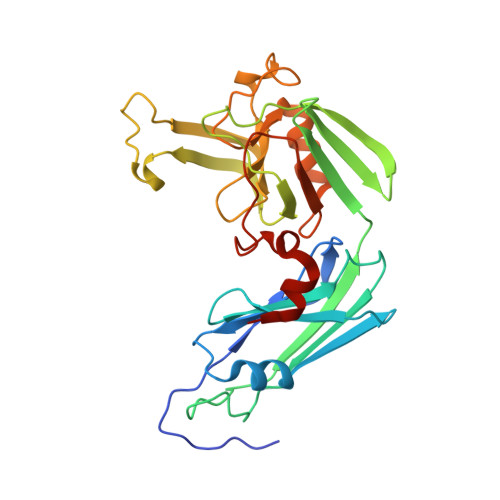The 1-beta-methyl group confers a lower affinity of l,d-transpeptidase LdtMt2for ertapenem than for imipenem.
Zhao, F., Hou, Y.J., Zhang, Y., Wang, D.C., Li, D.F.(2019) Biochem Biophys Res Commun 510: 254-260
- PubMed: 30686533
- DOI: https://doi.org/10.1016/j.bbrc.2019.01.082
- Primary Citation of Related Structures:
6IYV, 6IYW - PubMed Abstract:
L,D-transpeptidases, widely distributed in bacteria and even in the difficult-to-treat ESKAPE pathogens, can confer antibacterial resistance against the traditional β-lactam antibiotics through bypass of the 4 → 3 transpeptide linkage. Ldt Mt2 , a l,d-transpeptidase in Mycobacteria tuberculosis, is essential for bacterial virulence and is considered as a potential anti-tuberculosis target inhibited by carbapenems. Diverse interaction modes between carbapenems and Ldt Mt2 have been reported, there are only limited evidences to validate those interaction modes. Herein, we identified the stable binding states of two carbapenems, imipenem and ertapenem, via crystallographic and biochemical studies, discovered that they adopt similar binding conformations. We further demonstrate the absence of the 1-β-methyl group in imipenem and the presence of both Y308 and Y318 residues in Ldt Mt2 synergistically resulted in one order of magnitude higher affinity for imipenem than ertapenem. Our study provides a structural basis for the rational drug design and evolvement of novel carbapenems against bacterial L,D-transpeptidases.
- National Laboratory of Biomacromolecules, CAS Center for Excellence in Biomacromolecules, Institute of Biophysics, Chinese Academy of Sciences, Beijing, 100101, China; University of Chinese Academy of Sciences, Beijing, 100049, China.
Organizational Affiliation:





















